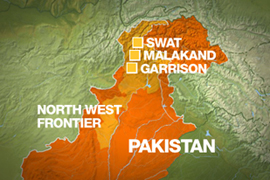Profile: Pakistani Taliban
Armed group has spread activities across the country, after being initially confined to border areas.

The Pakistani Taliban, whose operations were initialy focused mainly in North and South Waziristan in the country’s northwest region bordering Afghanistan, have managed to spread its area of influence.
The movement was formed after Western forces in 2001 forced the Taliban government from power in Afghanistan, where it had ruled since 1996, implementing its strict version of Islamic law.
Tehreek-i-Taliban Pakistan, or the Movement of the Taliban in Pakistan, is recognised as the largest faction of the movement in the country. It brings together over 20 Taliban groups located in Pakistan’s tribal areas and the provinces.
The Taliban has also been inreasingly gaining grounds in Punjab province, with loosely afiliated groups such as Lashkar-e-Taiba, Lashkar-e-Jangvi, Jaish-e-Mohamed and Harakat-ul-Mujahiddeen.
Afghan link
After the fall of the Taliban government in Kabul, many fighters fled over the porous Afghan border with Pakistan and found refuge in the inhospitable and mountainous territory of North and South Waziristan.
They paid local tribal leaders for their support against Pakistan’s security forces, and used the territory to assist attacks in border areas of Afghanistan.
Al-Qaeda elements are believed to hide in the same terrain, planning their assaults against international forces in Afghanistan.
The US and Afghan officials have repeatedly claimed that the top echelon of the Afghan Taliban are also based in Pakistan, in cities like Quetta and Karachi, a claim denied by Pakistani authorities.
Frequent attacks
The Taliban in Pakistan works in small groups and are highly mobile, carrying out surprise attacks on military and civilian targets, often causing a large number of deaths.
In February 2009, the civilian government of Asif Ali Zardari struck a controversial deal with the Taliban in the Malakand region, of which Swat is a part, in an attempt to restore peace.
The government agreed to implement a stricter version of Islamic law under condition the Taliban laid down their arms.
 |
The deal was negotiated by Sufi Muhammad, a Muslim religious leader who was released from jail the previous year to act as a go-between with the Taliban.
He had been imprisoned for sending men to fight against Western forces in Afghanistan during the 2001 US-led invasion.
Muhammad is the father-in-law of Mullah Fazlullah, the leader of the Taliban in the Swat valley.
Fazlullah and his followers have been accused of destroying about 200 schools, most of them for girls, and of beheading government officials.
The setting up of a sharia justice system for Malakand was approved by parliament and signed by Zardari, but the government insisted that it would not be implemented until the Taliban disarmed.
The deal was criticised by the US, which has pressured Pakistan to tackle the Taliban rather than negotiate with it.
The Pakistani military launched a largely successful offensive against the Taliban in October 2009, but the operations have displaced thousands of people.